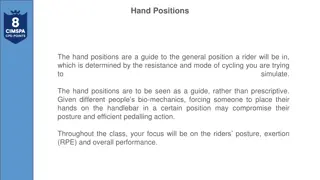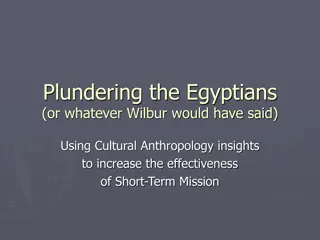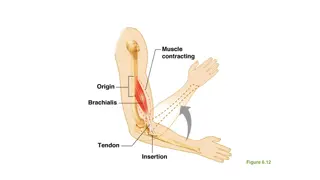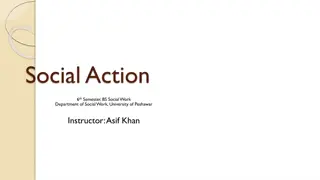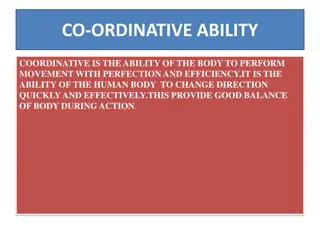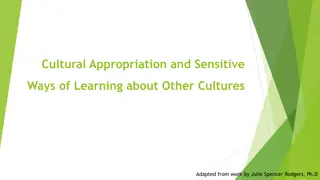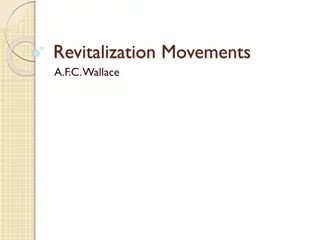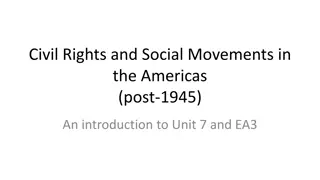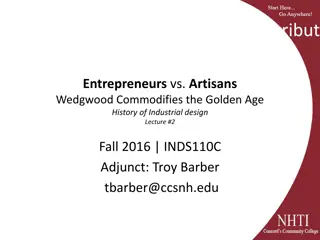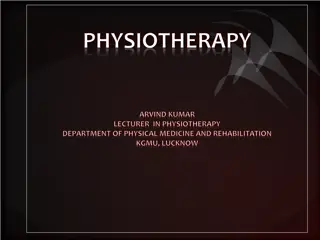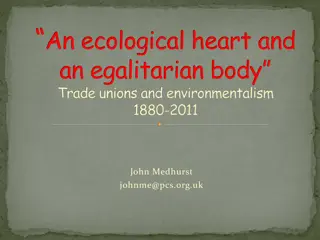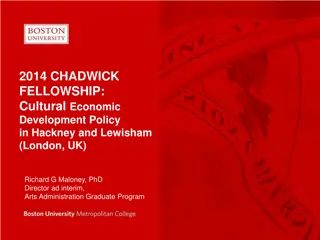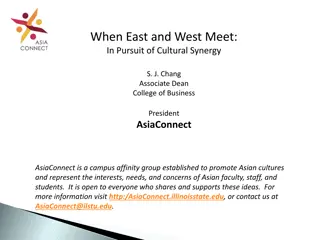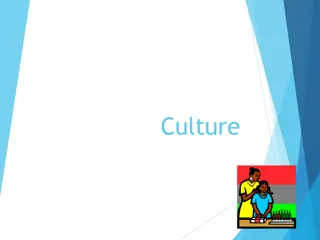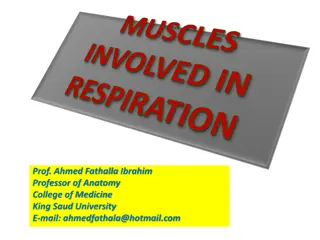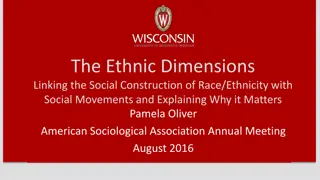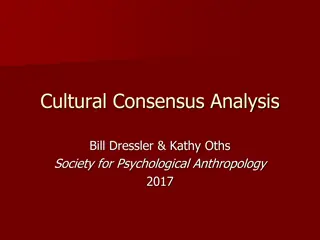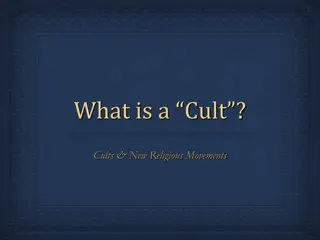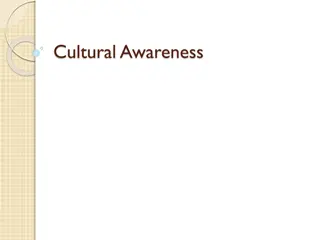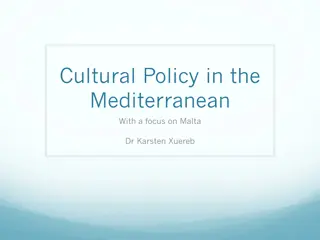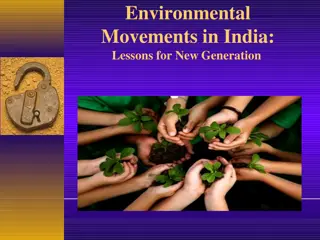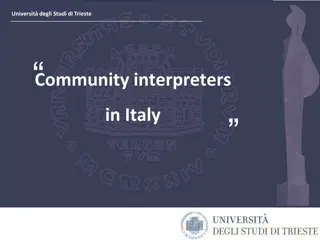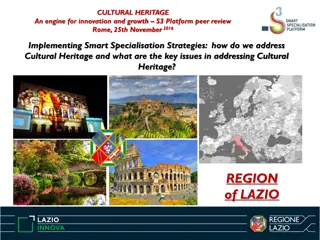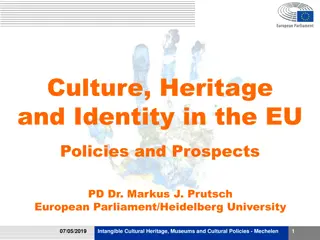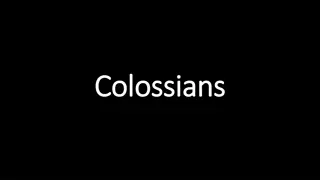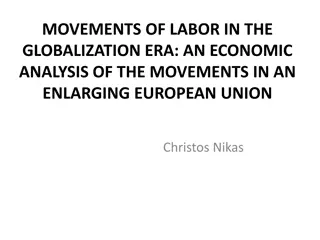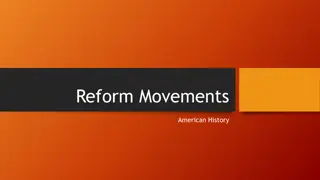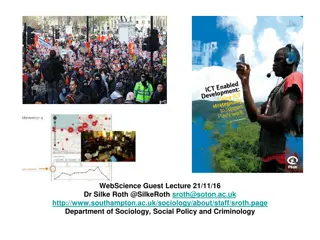Indoor Cycling: Hand Positions and Core Movements Guide
Indoor cycling involves different hand positions for various riding scenarios, focusing on rider posture and performance. The guide covers Hand Positions 1, 2, and 3, emphasizing relaxation, stability, and intensity adjustment. Additionally, it details core movements like Seated Flats, Standing Flat
8 views • 23 slides
Enhancing Short-Term Mission Effectiveness Through Cultural Anthropology Insights
Utilizing insights from cultural anthropology, this presentation delves into defining culture for short-term missions, viewing culture in successive levels, and key concepts such as cultural evolution and relativity. It explores the impact of culture on individuals and missions, emphasizing the impo
0 views • 16 slides
Comprehensive Guide to Body Movements and Special Movements
Explore different types of ordinary body movements such as flexion, extension, abduction, adduction, and circumduction, along with special movements like dorsiflexion, plantar flexion, inversion, eversion, supination, and pronation. Engage with detailed descriptions and visual representations of eac
3 views • 15 slides
Social Movements: History and Impact
Exploring the background and significance of social movements, this content delves into the evolution of society through various movements like the anti-slavery movement and labor movement. It discusses the types of movements, leaders, followers, tactics, and ways in which social movements can face
3 views • 21 slides
The Importance of Coordinative Abilities in Sports
Coordinative ability is crucial in sports for performing movements with precision and efficiency. It involves the body's capability to change direction swiftly, ensuring good balance during actions. This ability comprises various types such as orientation, reaction, rhythm, balance, adaptation, coup
1 views • 11 slides
Critics and Defenders in Multiculturalism Debate
Critics of multiculturalism argue that its focus on cultural inequalities diverts attention from socio-economic issues, while defenders like Kymlicka advocate for balancing cultural recognition with equal rights. Feminist critics raise concerns about cultural support for individual self-respect, par
0 views • 9 slides
Cultural Appropriation and Respectful Cultural Learning
This content delves into the concept of cultural appropriation, offering definitions, examples, and ways to avoid it. It emphasizes the importance of cultural appreciation and outlines the differences between appropriation and appreciation, highlighting the power dynamics involved. Readers gain insi
1 views • 16 slides
Enhancing Cultural Competency in Behavioral Health Professionals
This e-learning program, developed by the HHS Office of Minority Health, focuses on improving cultural competence for behavioral health providers. It covers topics such as the connection between culture and behavioral health, the impact of cultural identity on client interactions, and strategies to
0 views • 9 slides
Revitalization Movements by A.F.C. Wallace
Explore the concept of revitalization movements as explained by A.F.C. Wallace in his paper published in 1956. The theory delves into deliberate efforts by groups to create new cultures, drawing examples from historical and contemporary contexts. Discover the various theories surrounding revitalizat
0 views • 14 slides
Civil Rights and Social Movements in the Americas Post-1945: An Overview
Explore the history, challenges, and achievements of civil rights and social movements in the Americas post-1945. Learn about the struggles faced by African Americans, Indigenous peoples, feminist movements, Hispanic Americans, and youth culture protests. Discover pivotal moments such as the Montgom
0 views • 16 slides
Louisiana Cultural Districts: Engaging Communities in Cultural Development
The Louisiana Cultural Districts program, under the Cultural Economy Initiative, aims to revitalize local communities by creating hubs of cultural activity. By building on cultural resources and promoting art and culture, the program benefits from increased occupancy, commerce, and community identit
2 views • 18 slides
Influence of Art Movements on Industrial Design History
Baroque, Rococo, and Neoclassicism are art movements that have significantly influenced industrial design history. Baroque is characterized by exaggerated motion and drama, Rococo by playful and ornate designs, and Neoclassicism by simplicity and symmetry. These movements reflect societal trends and
9 views • 19 slides
Introduction to Physiotherapy: Modalities and Exercise Therapy
Physiotherapy, a branch of medical science, utilizes various modalities like electric current, heat/cold, water, and exercises for therapeutic treatment. It includes exercise therapy with active and passive movements, electrotherapy, thermotherapy, hydrotherapy, and massage. Active movements involve
4 views • 42 slides
Historical Overview: Trade Unions, Environmentalism, and Social Justice Movements
Explore the intertwined histories of trade unions, environmentalism, and social justice movements through key events such as the Bryant and May Match Girls' strike and the Triangle Shirtwaist factory fire. Visionaries like William Morris and Edward Carpenter advocated for fair working conditions, co
0 views • 46 slides
Cultural Economic Development Policy in Hackney and Lewisham: A Comparative Study
Building on previous research in Massachusetts, this project focuses on examining local government initiatives in cultural economic development in London boroughs of Lewisham and Hackney. The study explores the role of government in enhancing the cultural and creative industries, aiming to contribut
0 views • 7 slides
Movements in Graphs: Describing Trends Upward and Downward
Learn to describe and interpret graphs showing upward and downward movements using verbs, nouns, and prepositions. Explore expressions for dramatic changes, stability, and fluctuations in data. Understand how movements in graphs are depicted through various adjectives and adverbs.
0 views • 17 slides
Joint Motion: Osteokinematic and Arthrokinematic Movements
Joint motion involves osteokinematic movements, which are under voluntary control and include flexion, extension, and more. End-feel sensations like bony, capsular, and springy block indicate different joint conditions. Arthrokinematic motion refers to how joint surfaces move during osteokinematic m
1 views • 17 slides
Bridging East and West: Cultivating Cultural Understanding
Exploring the complexities and nuances of cultural differences between the East and the West, this article delves into the challenges of cultural synergy and the importance of fostering multicultural understanding. Highlighting the need for effective communication and empathy across cultures, it pre
0 views • 18 slides
Chile's Regulatory Framework for Capital Movements and Essential Security Measures
Chile's position under the OECD Code of Liberalization of Capital Movements is described along with its commitments in free trade agreements. The regulatory framework for capital movements in Chile allows for liberal participation of foreigners, with certain restrictions in sectors like air transpor
0 views • 21 slides
Cultural Diversity in Healthcare
The content explores the significance of cultural diversity in healthcare, emphasizing the increasing diversity of the population in the United States and the importance of cultural competence in nursing. It delves into cultural concepts, transcultural nursing, cultural context of health and caring,
0 views • 13 slides
Thoracic Cage and Respiratory Movements in Anatomy Lecture
Professor Ahmed Fathalla Ibrahim, a renowned Professor of Anatomy at King Saud University, covers the components of the thoracic cage, articulations, respiratory movements, and muscles involved in breathing in this informative lecture. Learn about the structure of the thoracic cage, articulations li
0 views • 24 slides
The Significance of Ethnicity and Race in Social Movements
Exploring the interconnectedness between the social construction of race/ethnicity and social movements, this presentation by Pamela Oliver delves into the relevance of race in both majority and minority movements. It emphasizes how race/ethnicity plays a crucial role in structures of domination, po
0 views • 55 slides
Cultural Consensus Analysis in Psychological Anthropology
Explore the essence of Cultural Consensus Analysis (CCA) as a significant aspect of psychological anthropology. Through ethnographic work and structured techniques, CCA helps verify shared knowledge within cultural domains and enhance the comprehension of cultural models. The model and steps involve
0 views • 64 slides
Cults and New Religious Movements
Explore the concepts of cults and new religious movements, comparing them to traditional religions. Delve into the defining characteristics of cults, sects, and controversial religious movements. Consider starting your own cult by examining teachings, rituals, authority, and organization. Reflect on
0 views • 23 slides
Structure and Movement of the Gastrointestinal Tract
The gastrointestinal tract (GIT) comprises four layers - Mucosa, Submucosa, Muscularis externa, and Serosa. Each layer plays a crucial role in the digestion process. The GIT undergoes gut motility, including propulsive movements like peristalsis and mixing movements, to facilitate the movement of fo
0 views • 25 slides
Gender Equality and Policy Impact Analysis in Feminist Movements
This presentation delves into the correlation between the strength of autonomous feminist movements and various policy indicators related to gender equality and women empowerment. The study covers a range of factors such as CEDAW ratification, regional agreements, democracy levels, GDP per capita, a
0 views • 14 slides
Cultural Awareness and Diversity in the United States
Explore the significance of cultural awareness, including definitions of culture, cultural groups, and subcultures. Learn about the diversity in the United States based on national origins, beliefs, customs, and shared characteristics. Discover how to interact positively with individuals from differ
0 views • 37 slides
Development and Application of Cultural Policy Typology for Arts and Culture
This research focuses on presenting a cultural policy typology based on goal variation and examining its application in a U.S. state art/cultural agency, specifically the Massachusetts Cultural Council. The study delves into the policy goals of the council and highlights the need for a specialized c
0 views • 16 slides
Cultural Policy in the Mediterranean with a Focus on Malta
Delve into the intricate web of cultural relations in the Mediterranean region, centered around Malta. From historical and political insights to postcolonial influences and the role of cultural policy, this exploration sheds light on the complexities and nuances shaping the cultural landscape. Disco
0 views • 23 slides
Environmental Movements in India - Overview and Major Movements
Environmental movements in India encompass a range of efforts aimed at conserving the environment, managing natural resources sustainably, and advocating for policy changes. From forest conservation to pollution issues, movements like the Bishnoi and Chipko have made significant impacts on environme
0 views • 24 slides
Environmental Movements in India: Lessons for a Sustainable Future
Environmental movements in India have evolved over time, driven by concerns of unbridled resource exploitation and environmental degradation. The emergence of these movements has been marked by a common interest in protecting the environment through policy changes and collective action. With a focus
0 views • 22 slides
Community Interpreting and Cultural Mediation in Italy: Insights from the University of Trieste
University of Trieste sheds light on the roles and qualifications of cultural mediators in Italy. The profession, categorized into linguistic and cultural mediation, plays a vital role in facilitating relationships between authorities and foreign residents, promoting integration, and dismantling lan
0 views • 9 slides
Cultural Heritage as an Engine for Innovation and Growth in the Region of Lazio
Discussing the significance of cultural heritage in driving innovation and growth in the Region of Lazio, this report highlights the key elements and issues related to smart specialization strategies. It emphasizes the economic impact of tourism and cultural heritage in terms of enterprises, value a
0 views • 19 slides
Cultural Heritage and Identity in EU Policies
Delve into the significance of cultural heritage and identity in European Union policies through a presentation discussing the evolution of heritage, European identity concepts, and EU heritage policies since the 1970s. Explore the intertwined nature of cultural heritage with European integration an
0 views • 11 slides
Involuntary and Voluntary Movements in the Body
Involuntary movements, such as contraction and relaxation, are controlled by the autonomic nervous system and are essential for daily functions like heartbeat regulation. On the other hand, voluntary movements involve conscious control over skeletal muscles to regulate body movement. Biblical verses
1 views • 54 slides
Guidelines for Quarantine and Movement Control
Movement control measures are crucial in preventing the transmission of pathogens and maintaining business continuity. This presentation outlines the procedures for permitting and authorizing movements, along with general personnel responsibilities based on FAD-PReP/NAHEMS guidelines. It covers rest
0 views • 28 slides
Analysis of Labor Movements in the Globalization Era
Contemporary labor movements in the era of globalization differ from previous periods, influenced by factors such as globalization, European integration, the collapse of the socialist system, and economic disparities. The dynamics of migration have evolved, impacting various countries and regions. T
0 views • 29 slides
Reform Movements
The reform movements in American history, including abolition and women's rights. Understand the concept of reform and how it shaped society. Dive into essential questions about the changes brought by these movements. Discover transcendentalism and utopian ideals. Reflect on present-day reform possi
1 views • 18 slides
Managing Cross-Cultural Interactions
Cross-cultural management involves navigating interactions and relationships between individuals from diverse cultural backgrounds. It is essential in today's globalized world to understand and respect the differences in cultural norms, values, and communication styles to foster effective collaborat
0 views • 26 slides
Dr. Silke Roth - Social Movements and Digital Humanitarianism
Dr. Silke Roth's research interests include meaningful work, activism, social justice, digital inequalities, intersectionality, social movements, protest, and digital humanitarianism. Explore the causes and outcomes of social movements, as well as the power dynamics and electronic repertoires of con
0 views • 15 slides
